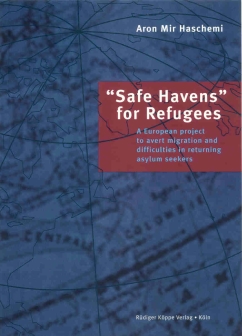
“Safe Havens” for Refugees
A European Project to Avert Migration and Difficulties in Returning Asylum Seekers?
Author: Aron Mir Haschemi.
200599 pp.
Text language(s): English
Format: 160 x 240 mm
180 g
Paperback
€ 29.80
Buy '“Safe Havens” for Refugees' as a downloadable PDF document directly from our online shop »
Order '“Safe Havens” for Refugees' as print edition »
A history of and reasoning behind the concept of extraterritorial refugee sites, called safe havens in the public discourse, is provided in this study. Since the 1990s, this concept has been used by the United States of America to accommodate asylum seekers from Haiti and Cuba. From 1998, the government of Australia introduced safe havens for refugees – first within its own territory, then in small islands of the South Pacific belonging to other states. Over time, this caused uproar in civil society at both national and international level.
The author analyses how the United Kingdom learnt from American and Australian experiences. The implementation of new migration and refugee policies in the late 1990s aimed at avoidance of influx of asylum seekers. It was therefore meant to avert difficulties in returning them to the country of origin once an application had been turned down. With the same rationale and to share the burden of extraordinarily high immigration numbers with fellow EU members, the UK proposed extraterritorial refugee safe havens as a common EU strategy to cope with asylum seekers.
Aron Mir Haschemi describes the development of the proposal to the EU from the onset in February 2003 through to the discussion following the European Council meeting in Thessaloniki in late June of that year. The legal and political analysis shows that European policy debate and policy making will now tend towards extraterritorial migrant and refugee handling. Aron Mir Haschemi was trained as an international lawyer in France. He now works in the German Foreign Ministry.
Under these links, you will find further empirical studies focusing on migration and the position of asylees in Germany and other societies:
Accompanying material:
- Asylverfahren und Gerechtigkeit
(ISBN 978-3-89645-854-4 ) - Nation im Exil?
(ISBN 978-3-89645-826-1 ) - The Ingrained Art of Survival
(ISBN 978-3-89645-250-4 )
Cross-reference:
- Arbeit, Sklaverei und Erinnerung
(ISBN 978-3-89645-349-5 ) - Les Fulbe du Boobola
(ISBN 978-3-89645-301-3 ) - Lifeworlds of Young Men beyond Migration and Immobility in Pikine, Senegal
(ISBN 978-3-89645-914-5 ) - Migration and Conflict
(ISBN 978-3-89645-903-9 ) - Nomades des espaces interstitiels
(ISBN 978-3-89645-252-8 ) - Spaces in Movement
(ISBN 978-3-89645-905-3 )
Reviews
Seit dem Ende der 90er-Jahre hat die britische Regierung das zuvor in Australien und den USA praktizierte migrationspolitische Konzept der safe havens für sich entdeckt und 2003 der EU als gemeinsame Strategie zur Vermeidung übermäßiger Einwanderung von Flüchtlingen vorgeschlagen. Das Konzept sieht die Einrichtung von extraterritorialen Unterkünften für Asylsuchende in Drittstaaten bzw. von Schutzzonen in den Herkunftsländern vor. Der Autor stellt die Geschichte dieses einwanderungspolitischen Konzepts dar, geht auf die australische und britische Praxis ein und zeichnet die Diskussion des Vorschlags innerhalb der EU nach. Dabei berücksichtigt Haschemi die Haltung des UNHRC und Stellungnahmen aus den Reihen verschiedener zivilgesellschaftlicher Akteure. Den Schwerpunkt bilden rechtliche Aspekte.
Anke Rösener in Portal für Politikwissenschaft, http://pw-portal.de/rezension/24528-safe-havens-for-refugees_28329, 1
| « back | Print version | [top] |
 Books
Books Audio
Audio Biographies
Biographies Series
Series Festschrifts
Festschrifts Journals
Journals